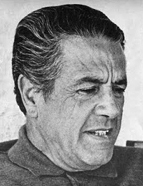

Jorge Dias was born into a prosperous middle-class family from Porto, with landholdings in the Minho region. From an early age, he displayed a keen interest in rural life, travelling with friends around the n orth of the country, spending time in villages, and even working in a circus for fun and out of a sense of solidarity with the performers. Having completed his studies relatively late, he graduated in Germanic Philology from the University of Coimbra and earned a doctorate in Ethnology (Volkskunde) from the University of Munich in 1944, with the thesis Vilarinho da Furna, Um Povo Autárquico da Serra Amarela. [Vilarinho da Furna, Communal People of the Serra Amarela]. He met his wife, Margot, in Munich and she became his research companion throughout his life. He later obtained another doctorate in Ethnology in 1965 from the Faculty of Arts of the University of Lisbon, with the dissertation Os Macondes de Moçambique [The Makonde of Mozambique] .
He was a Portuguese lecturer at the universities of Rostock, Munich, Berlin, Santiago de Compostela, and Madrid between 1938 and 1947. His academic trajectory led him to teach ing positions at the Faculties of Arts of the Universities of Coimbra and Lisbon. He was also part of the teaching staff at the Higher Institute of Overseas Studies—formerly the Colonial Higher School and the predecessor of today's ISCSP—where he was full professor and taught cultural anthropology for several years before passing away.
His academic trajectory was accompanied by a research career that began in 1947 when he took over the Ethnography section of the Centre for Peninsular Ethnology Studies and formed what would become his team, consisting of his wife Margot, Fernando Galhano, Ernesto Veiga de Oliveira, and later Benjamim Pereira. This group committed themselves to the exhaustive study of Portuguese ethnography, focusing particularly—but not exclusively—on material culture in rural areas and technologies related to agricultural activities (Ernesto Veiga de Oliveira, " António Jorge Dias ").
